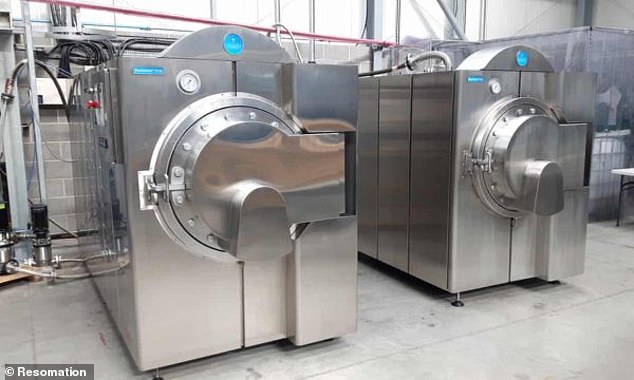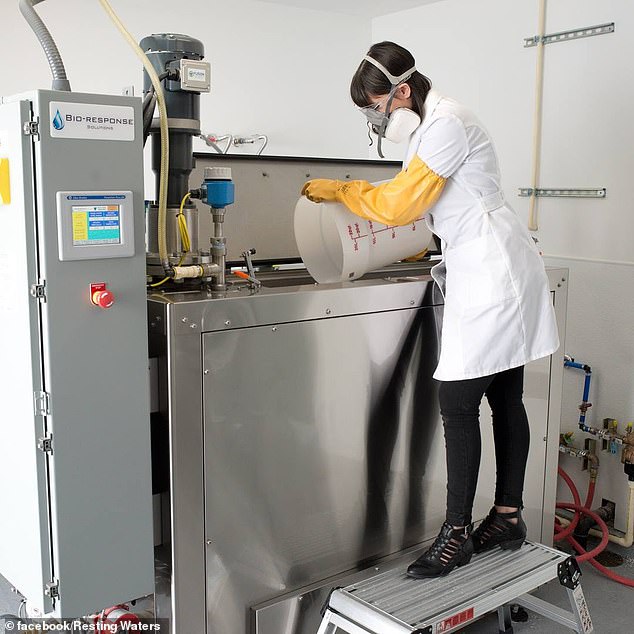Putting a loved one to rest in the UK typically involves either a ground burial or a flame-based cremation.
But an alternative method could finally get the go-ahead.
A new consultation into funerary methods by the independent Law Commission could finally result in legal approval of ‘boil in a bag’ funerals in the UK.
At the moment, there is no regulatory framework for the method, officially known as water cremation or alkaline hydrolysis – effectively banning it from use in the country.
Water cremation involves rapidly decomposing a corpse in water and alkaline chemicals under high temperatures, leaving only liquid and bones.
The liquid, known as ‘effluent’, can go down the drain with other wastewater and bones that can be ground to ash for the bereaved owner to take home.
Advocates say the method is better for the environment, but others believe it is an undignified way to dispose of the dead.
Here’s a look at how the controversial method works.

Officially known as water cremation or alkaline hydrolysis, the process involves rapidly decomposing a corpse in water and alkaline chemicals under high temperatures in a big steel vessel (pictured)
What is water cremation?
Water cremation uses water, alkaline chemicals, heat, and sometimes pressure and agitation, to accelerate natural decomposition, leaving bone fragments and a neutral liquid called effluent.
The effluent is sterile, and contains salts, sugars, amino acids and peptides – but no tissue or DNA is left.
This effluent is discharged with all other wastewater, while the softened bone can be ground up for the owner to take home and lay to rest, much like ashes – although any metal hip and knee joints come out unchanged.
At the Bradshaw Celebration of Life Center in Minnesota, there’s an alkaline hydrolysis machine located in the basement that cost $750,000 (£580,000) to install about a decade ago.
Bodies go into the rectangular steel box, which is about six feet high and four feet wide and looks like part of a high security ‘bank vault’.
With just the press of a few buttons, the machine locks and starts to fill with water – and the 90-minute process can begin.
By the end, all tissue has dissolved and is free from DNA – and is a brown colour that somewhat resembles ‘tea or an ale’.

Water cremation speeds up body’s breakdown, turning all but bones into liquid. Pictured, a vessel called a resomator used for water cremations

The human remains are rinsed in a solution at 120C (248F), dried and pulverised into powder before being handed to relatives to be kept or scattered

A staff member at Seattle company Resting Waters, which provides the method for beloved pets
According to one Wired journalist who visited a water cremation facility in California, the liquefied human body ‘smells like steamed clams’.
Any metal hip and knee joints come out unchanged, but otherwise all that’s left is the bones, which now crumble and fall apart to the touch and can be easily ground down and scattered much like ashes, or kept.
Water cremation is not new – the process was originally patented in 1888 – but only now is it becoming an option for the general public.
Some see religious connotations in water cremation, echoing the use of water in baptism at the start of a life.
Why is water cremation controversial?
Critics argue that dissolving bodies and disposing of the resulting liquid down the sewers along with other wastewater lacks dignity.
In certain religious and cultural communities, water cremation is barred due to its perceived desecration of the body.
Dr Lian Lundy, a wastewater specialist at Middlesex University, said the biggest hurdle blocking it in the UK is social acceptability.

Pictured, US politicians at an alkaline hydrolysis disposal system at Kansas State University, in Manhattan

Staff at the Bradshaw Celebration of Life Center operate the alkaline hydrolysis machine located in the basement
‘Some people view it as basically mixing up my loved one with poo in the sewer and they don’t like that,’ she told the Telegraph.
‘But there’s a lot that goes into the sewer that we don’t really think about – waste from mortuaries and hospitals and all sorts of things that we don’t know about – so from that perspective, it’s not really any different.’
Where is water cremation available?
Water cremation is already available to the general public in nearly 30 states in America and is also permitted in Canada and South Africa.
Ireland opened its first water cremation facility in early 2023 – the first of its kind in Europe.
But in the UK, regulatory hurdles are preventing the method from becoming available.
When will water cremation come to the UK?
Co-op Funeralcare, which arranges more than 93,000 funerals every year, revealed in 2023 it would start to offer the service for deceased Brits, but plans were delayed as it was ‘unable to find a path through the current regulatory framework’.

Staff at the Bradshaw Celebration of Life Center in Minnesota (pictured) offers what it describes as a ‘gentle, eco-friendly alternative’ to flame-based cremation

Co-op Funeralcare, which will offer the service for deceased Brits, currently arranges more than 93,000 funerals every year – and hopes to add water cremation soon
Co-op Funeralcare welcomed the consultation on new funerary methods, which could potentially see water cremations come to the UK by the end of the decade.
A spokesman from Co-op Funeralcare said: ‘At Co-op Funeralcare, we are committed to serving the needs of our member-owners and clients and offering the most sustainable and affordable services.
‘In 2023, we announced our ambition to pilot Resomation in the UK, and we subsequently worked closely with the Government to explore the regulatory requirements to introduce this service across the nation.
‘However, we did not proceed with this as, at the time, we were unable to find a path through the current regulatory framework.
‘We welcome The Law Commission’s review and encourage exploration into alternative methods that provide consumers with greater choice and deliver environmental benefits.’
How much will water cremation be?
While the cost for water cremations remains unclear, it’s expected to be around the same prices as a traditional cremation – a few thousand pounds.
In countries where water cremation is already legal, the price typically ranges from $1,500 (£1,180) to $5,000 (£3,950), depending on the provider and location, the Farewell Guide explains.

In the UK, water cremation will offer an alternative to the commonly-used land burials and flame cremations (pictured)
‘In the UK, once the service becomes available, the cost of water cremation will likely be competitive with regular cremation prices,’ it adds.
At the Bradshaw Celebration of Life Center in Minnesota, it costs $3,395 (£2,500) for a ‘basic cremation’ and $4,995 (£3,680) for an additional memorial service.
Why are water cremations better for the environment?
Advocates describe the method as ‘green cremation’ as it’s a more eco-friendly alternative to land burials (which can pollute the soil) and flame-based cremations.
A traditional cremation using flames consumes fuel and releases large amounts of carbon dioxide and other pollutants into the air.
According to the US Environmental Protection Agency, the average cremation produces about 535 pounds of carbon dioxide, which is equivalent to driving a car about 600 miles.
Land burials, meanwhile, pose the problem of the vessel containing the corpse taking years to decompose in the soil if it’s made of metal or plastic.
Even if the vessel is compostable, such as a pine box, the decomposing corpse doesn’t usually have a healthy impact on the soil and can often stop grass and plants growing properly.
